Want to know more about the Best Chemical Engineering Schools In the US and make an informed decision? Here is a good place to start.
Chemical engineering is a highly competitive field that draws from principles in chemistry, physics, mathematics, and biology to address complex problems related to the production and use of chemicals.
When considering a career as a chemical engineer, choosing the right school is one of the most important decisions you will make.
To help you make an informed choice, we have compiled a list of the best chemical engineering schools in the United States based on academic reputation, research opportunities, and other key factors.
Please note that schools are selected based on our criteria (at the end of the article), ranked by the latest acceptance rate.
Table of Contents
#25. Colorado State University


- Acceptance rate: 89.6%
- Average entry score: 1080-1290 SAT or 23-29 ACT
- Student-to-faculty ratio: 17:1
- Estimated cost of attendance (tuition and fees): $29,109-$48,389
- Average earning potential for graduates: $49,900 (College Simply)
Colorado State University’s The Walter Scott, Jr. College of Engineering is home to one of the most respected and well-known chemical engineering programs in the country. This college offers undergraduate and graduate degrees in chemical engineering to students from across the globe.
The chemical engineering program at Colorado State University is accredited by the Engineering Accreditation Commission of ABET, ensuring that students receive a high-quality education that prepares them for success in their careers after graduating.
Students who attend Colorado State University can expect to graduate with a strong understanding of engineering principles and how they apply to real-world scenarios.
#24. Arizona State University


- Acceptance rate: 88.2%
- Average entry score: 1120-1180 SAT or 22-24 ACT
- Student-to-faculty ratio: 18:1
- Estimated cost of attendance (tuition and fees): $31,127-$32,207
- Average earning potential for graduates: $71,100 (College Simply)
Arizona State University offers ABET-accredited chemical engineering programs at both the undergraduate and graduate level. The aim of the program is to ensure that students are well-rounded and prepared to enter the workforce when they graduate.
The curriculum focuses on the fundamentals of engineering, with courses that cover topics such as chemistry and physics. This program provides graduates with a wide range of career options, including jobs in biotechnology, government, and materials science.
#23. University of Minnesota–Twin Cities


- Acceptance rate: 73.2%
- Average entry score: 1330-1500 SAT or 27-32 ACT
- Student-to-faculty ratio: 17:1
- Estimated cost of attendance (tuition and fees): $23,110-$52,088
- Average earning potential for graduates: $67,200 (College Factual)
The University of Minnesota–Twin Cities offers a well -rounded engineering program for students who are interested in making a difference in the world. This institution teaches students how to think critically and solve problems in a way that allows them to make an impact on society.
With an experienced and dedicated faculty, the Department of Chemical Engineering and Materials Science offers students the opportunity to work on cutting-edge research and gain real-world experience.
As a result of their experience, students are able to enter the workforce with skills that employers need. Therefore, the degree from the University of Minnesota–Twin Cities is highly regarded by industry leaders, and graduates have a high rate of employment.
What is it like to study at the University of Minnesota–Twin Cities?
#22. University of Delaware


- Acceptance rate: 72.3%
- Average entry score: 1160-1350 SAT or 24-30 ACT
- Student-to-faculty ratio: 12:1
- Estimated cost of attendance (tuition and fees): $31,562-$53,422
- Average earning potential for graduates: $70,693 (College Factual)
The University of Delaware is a public research university located in Newark, Delaware. The school is known for its strong undergraduate chemical engineering programs. Students who attend the school will have access to a variety of resources and opportunities.
The school’s engineering program is accredited by the Accreditation Board for Engineering and Technology (ABET). This is a nonprofit organization that oversees the quality of collegiate engineering programs.
At the University of Delaware, graduates can enroll in the school’s graduate program in chemical engineering. This program offers a detailed curriculum to students who want to learn more about the field.
Similar articles like this:
#21. Auburn University

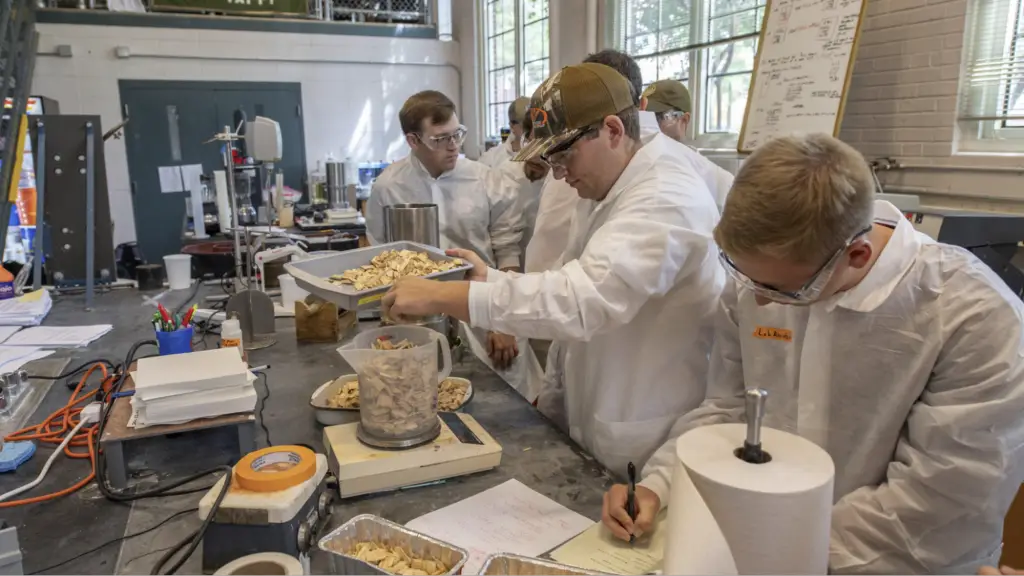
- Acceptance rate: 71%
- Average entry score: 1170-1350 SAT or 24-30 ACT
- Student-to-faculty ratio: 20:1
- Estimated cost of attendance (tuition and fees): $32,678-$52,838
- Average earning potential for graduates: $75,285 (AL.com)
Auburn University has incorporated technology and innovation into its curriculum to help students gain the skills they need to enter a wide variety of fields. The school’s chemical engineering program provides students with an education that is both broad and deep, preparing them for careers in many different areas.
Located in Auburn, Alabama, the school trains students to become leaders in the chemical engineering field. The school has an excellent reputation for preparing students to enter the workforce after graduation.
They offer a number of scholarships and financial aid opportunities for students who qualify. The school also has an active alumni network that provides students with additional career resources.
#20. Clarkson University


- Acceptance rate: 66.2 %
- Average entry score: 1160-1350 SAT or 25-32 ACT
- Student-to-faculty ratio: 13:1
- Estimated cost of attendance (tuition and fees): $75,833
- Average earning potential for graduates: $65,400 (College Simply)
Clarkson University offers a Bachelor’s of Science degree in chemical engineering. Students in this program will learn how to create products using raw materials such as crude oil and natural gas. They will also develop an understanding of how these products are used by businesses and individuals around the country.
With its location in upstate New York, this school provides students with a unique opportunity to experience life outside of a major metropolitan area. While at Clarkson, students will have access to state-of-the-art facilities and equipment that they can use for their research projects.
#19. University of Wisconsin–Madison

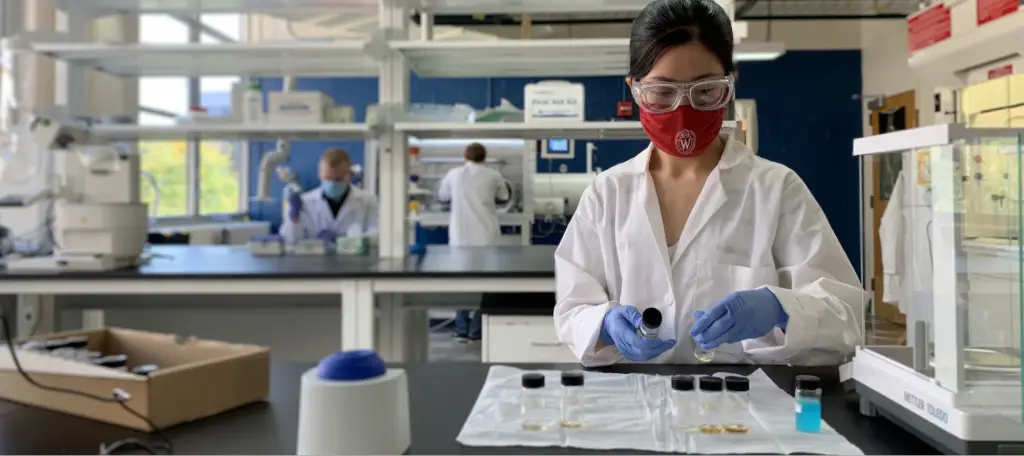
- Acceptance rate: 60.4%
- Average entry score: 1300-1480 SAT or 28-32 ACT
- Student-to-faculty ratio: 18:1
- Estimated cost of attendance (tuition and fees): $27,484-$55,372
- Average earning potential for graduates: $72,510 (College Factual)
The University of Wisconsin–Madison offers an ABET-accredited chemical engineering program that strives to provide students with a strong foundation in mathematics, science, and engineering.
Their curriculum is designed to give students a solid understanding of chemical engineering concepts, including thermodynamics, fluid mechanics and process design.
With the help of dedicated staff, students in the program are able to gain hands-on experience through internships and research opportunities. They also have access to state-of-the-art facilities and a network of industry professionals who are willing to provide students with guidance and support.
#18. University of Illinois at Urbana-Champaign


- Acceptance rate: 59.7%
- Average entry score: 1210-1470 SAT or 27-33 ACT
- Student-to-faculty ratio: 21:1
- Estimated cost of attendance (tuition and fees): $33,060-$50,510
- Average earning potential for graduates: $74,131 ( The Grainger College of Engineering)
The University of Illinois at Urbana-Champaign offers a chemical engineering degree program that is accredited by the Accreditation Board for Engineering and Technology (ABET). This program provides graduates with the knowledge and skills needed to enter the workforce as competent chemical engineers.
The chemical engineering department at the University of Illinois boasts an outstanding faculty, and students have access to world-class research facilities. Students in the chemical engineering program at the University of Illinois have ample opportunities to gain real-world experience.
Similar articles like this:
- 25 Best Dental Schools In The US
- 25 Best Schools For Geology In The US
- 25 Best Schools For Marine Biology In The US
#17. Clemson University

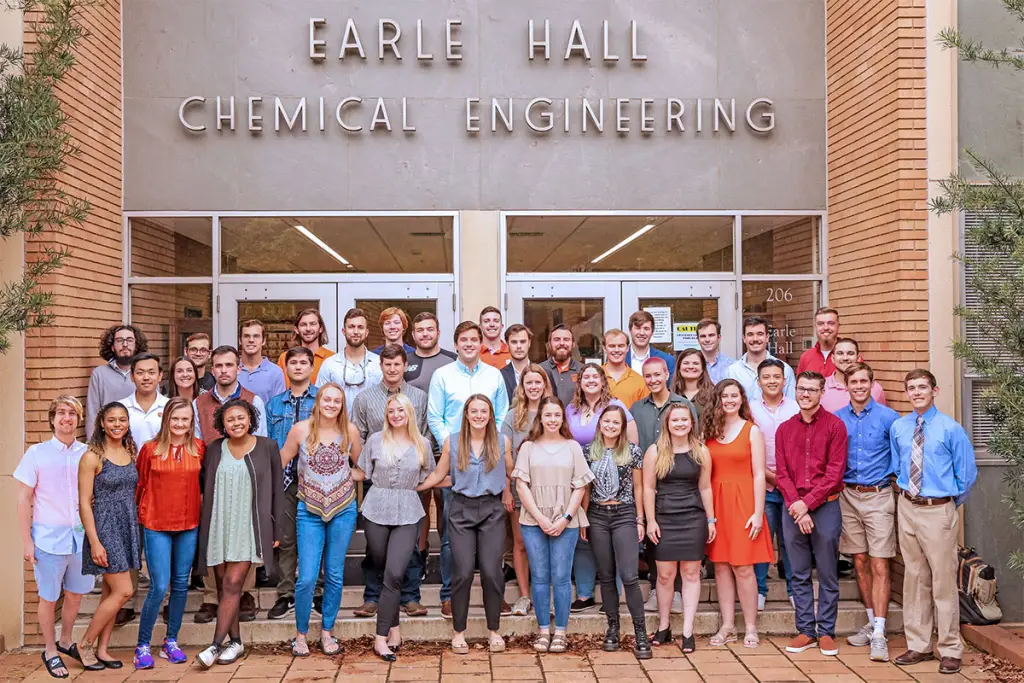
- Acceptance rate: 49.2%
- Average entry score: 1230-1400 SAT or 27-32 ACT
- Student-to-faculty ratio: 18:1
- Estimated cost of attendance (tuition and fees): $34,096-$57,088
- Average earning potential for graduates: $72,400 (College Simply)
Clemson University blends a solid foundation in the sciences with an emphasis on hands-on learning to provide students with a well-rounded education.
The chemical engineering program at Clemson University provides students with a strong foundation in mathematics, chemistry, biology, and physics that they can use throughout their careers.
This program provides students with opportunities to gain real-world experience through internships and research projects. Students in the program have access to some of the best facilities on campus, including state-of-the-art lab space and equipment.
#16. University of Texas–Austin


- Acceptance rate: 32%
- Average entry score: 1230-1500 SAT or 29-34 ACT
- Student-to-faculty ratio: 16:1
- Estimated cost of attendance (tuition and fees): $28,928-$57,512
- Average earning potential for graduates: $77,000 (Cockrell School of Engineering)
The Cockrell School of Engineering combines principles of chemistry, physics, and mathematics to create a unique engineering program. Besides a comprehensive curriculum, students can also take advantage of the school’s facilities.
The Cockrell School of Engineering has a number of research centers available to students. These facilities play a key role in the school’s mission to push the boundaries of engineering theory and practice.
Students learn how to use tools and equipment that are state-of-the-art, allowing them to create innovative solutions.
What is it like to study chemical engineering at the University of Texas?
#15. Case Western Reserve University


- Acceptance rate: 30.2%
- Average entry score: 1420-1510 SAT or 32-35 ACT
- Student-to-faculty ratio: 9:1
- Estimated cost of attendance (tuition and fees): $62,234
- Average earning potential for graduates: $69,200 (College Simply)
Case Western Reserve University emphasizes the importance of hands-on experience and the ability to think critically.
This school, through its Department of Chemical and Biomolecular Engineering, provides students with the opportunity to work closely with faculty members and other researchers on projects that will have a direct impact on their future careers.
Case Western also provides students with access to an extensive network of alumni that can help them find jobs after graduation. The school offers a number of undergraduate and graduate programs in chemical engineering to prepare students for careers in the field.
With its location in Cleveland, Ohio, this school provides students with the chance to experience life in the Midwest while still having access to many popular cities like Chicago and Detroit, Michigan.
#14. University of California–Santa Barbara


- Acceptance rate: 29.2%
- Average entry score: 26-31 ACT
- Student-to-faculty ratio: 17:1
- Estimated cost of attendance (tuition and fees): $37,415-$67,169
- Average earning potential for graduates: $61,540 (College Factual)
UCSB has earned a reputation for being at the forefront of research and innovation. This is reflected in its high-quality curriculum. The school’s ABET-accredited chemical engineering program provides students with a deep understanding of the principles and applications of chemical engineering.
Students will also learn how to solve complex problems in a variety of fields. They can then apply this knowledge in their own research projects that are often conducted alongside faculty members.
UCSB boasts a strong alumni network that provides students with opportunities for continued learning and development. Graduates are also well-positioned for future employment in their field due to the school’s close ties with local employers.
Similar articles like this:
- 25 Best Schools For Agricultural Sciences In The US
- 25 Best Schools For Renewable Energy Degrees In The US
- 25 Best Engineering Schools In The US
#13. University of Michigan–Ann Arbor


- Acceptance rate: 20.2%
- Average entry score: 1360-1530 SAT or 31-34 ACT
- Student-to-faculty ratio: 15:1
- Estimated cost of attendance (tuition and fees): $32,272-$69,326
- Average earning potential for graduates: $75,199 (College Factual)
Michigan chemical engineering aims to prepare students for the challenges of a global economy by offering a rigorous education in chemical engineering. The program emphasizes fundamentals, problem-solving, and responsibility. It also provides students with an opportunity to apply their knowledge through research projects.
Through a combination of classroom instruction and hands-on experience, students learn how to apply the principles of chemistry, physics, and mathematics to the field of chemical engineering. The school also offers students the opportunity to develop their leadership skills by taking part in student organizations.
#12. Georgia Institute of Technology


- Acceptance rate: 16%
- Average entry score: 1390 SAT
- Student-to-faculty ratio: 21:1
- Estimated cost of attendance (tuition and fees): $31,898-$53,010
- Average earning potential for graduates: $75,560 (College Factual)
The College of Engineering at Georgia Tech is well-known for its high-quality academics. The college is home to 8 engineering schools, which offer a variety of degrees, including Bachelor’s, Master’s, Ph.D., and professional certificates.
Chemical engineering students at Georgia Tech enjoy a challenging curriculum that prepares them to enter the workforce with a solid foundation in chemical engineering principles.
The school has a reputation for its research-focused programs. It’s ranked as one of the best chemical engineering schools in the country by U.S. News & World Report and is highly regarded by industry leaders.
What is it like to study at Georgia Tech?
#11. University of California, Berkeley

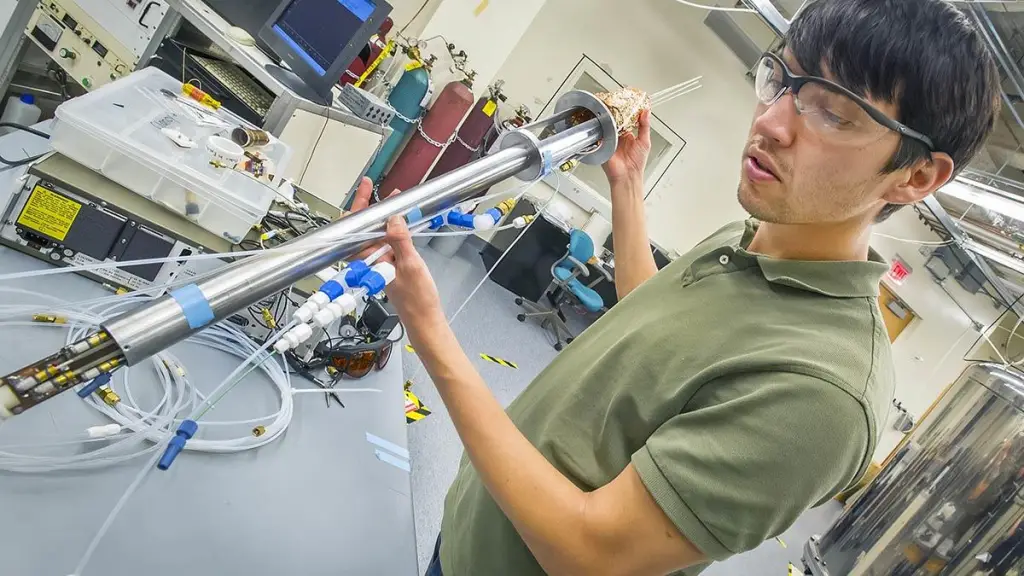
- Acceptance rate: 14.4%
- Average entry score: 1415 SAT
- Student-to-faculty ratio: 17:1
- Estimated cost of attendance (tuition and fees): $41,878-$71,632
- Average earning potential for graduates: $70,767 (College Factual)
The University of California, Berkeley is one of the most prestigious universities in the world. It is also one of the largest public research institutions in the United States and has produced many notable alumni.
UC Berkeley offers students access to an extensive library system and state-of-the-art laboratories where they can conduct hands-on research.
The Berkeley College of Chemistry has a comprehensive chemical engineering program that includes both undergraduate and graduate courses. Students in this program have the opportunity to participate in research projects at various locations around the world.
What is it like to study chemical engineering at the University of California, Berkeley?
#10. Carnegie Mellon University

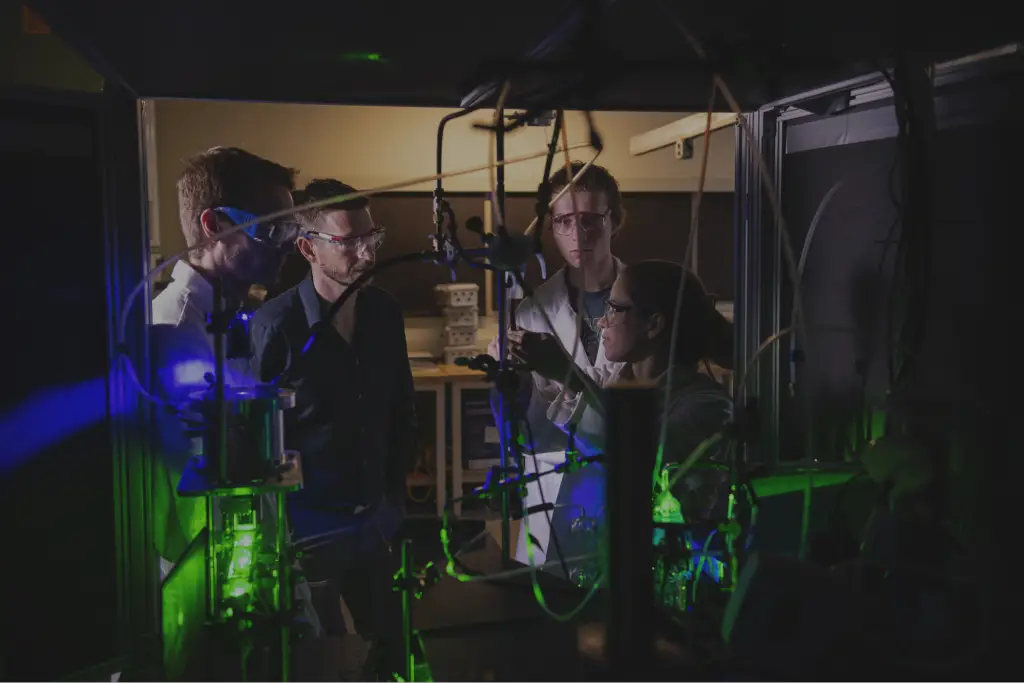
- Acceptance rate: 13.5%
- Average entry score: 1480-1560 SAT or 33-35 ACT
- Student-to-faculty ratio: 6:1
- Estimated cost of attendance (tuition and fees): $77,474
- Average earning potential for graduates: $73,100 (College Simply)
In addition to its strong engineering programs, Carnegie Mellon University is also known for its emphasis on research. The school is consistently ranked as one of the top institutions in the world for research and development.
This school also has a well-regarded undergraduate chemical engineering program, where students benefit from world-class faculty. Students are encouraged to participate in research early on, allowing them to work closely with their professors and learn how the real world works.
After completing the program, graduates are prepared for careers in both academia and industry.
Similar articles like this:
- 25 Best Forestry Schools In The US
- 25 Best Schools For Environmental Science In The US
- 25 Best Schools For Health Sciences Degrees In The US
#9. Cornell University


- Acceptance rate: 11%
- Average entry score: 1450-1560 SAT or 33-35 ACT
- Student-to-faculty ratio: 9:1
- Estimated cost of attendance (tuition and fees): $78,992
- Average earning potential for graduates: $74,126 (College Factual)
The Robert Frederick Smith School of Chemical and Biomolecular Engineering at Cornell University is one of the oldest and most prestigious schools in the country. This school offers undergraduate and graduate programs in chemical engineering, as well as a Ph.D. program for students who want to pursue research careers.
Cornell University gives you the opportunity to work with some of the most talented faculty in the country. You can work on cutting-edge projects that are solving some of the world’s biggest problems. Cornell University’s alumni network of chemical engineers can help you find a job after graduation.
#8. Dartmouth College

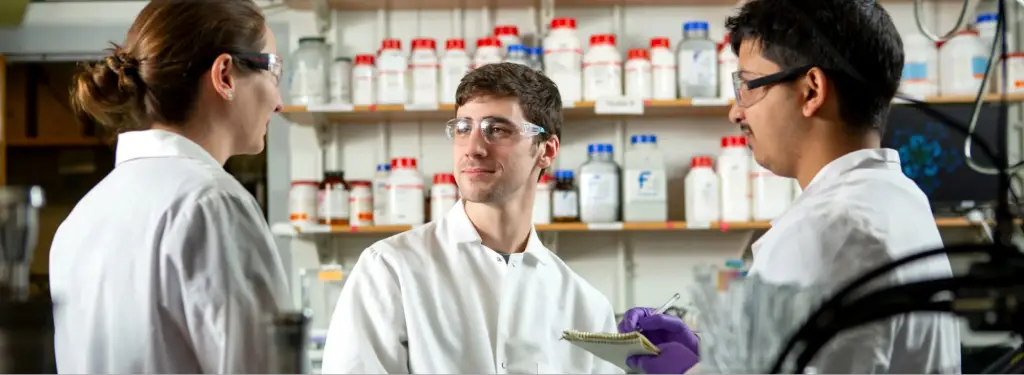
- Acceptance rate: 6.2%
- Average entry score: 1449-1560 SAT or 32-35 ACT
- Student-to-faculty ratio: 7:1
- Estimated cost of attendance (tuition and fees): $81,662
- Average earning potential for graduates: $38,900-$100,500 (Dartmouth)
This private Ivy League research university features a supportive environment for graduate and undergraduate students interested in pursuing a career in the sciences.
Dartmouth College is home to one of the nation’s top biological and chemical engineering programs. Their integrated curriculum allows you to explore a variety of topics while gaining hands-on experience with cutting-edge equipment.
Students also have access to world-class labs that feature state-of-the-art technology. They learn under the mentorship of world-class faculty members who are actively involved in research. At Dartmouth, you can pursue a Bachelor’s, Master’s, or Doctoral degree in biological or chemical engineering.
#7. The University of Pennsylvania


- Acceptance rate: 5.9%
- Average entry score: 1460-1570 SAT or 33-35 ACT
- Student-to-faculty ratio: 7:1
- Estimated cost of attendance (tuition and fees): $65,790
- Average earning potential for graduates: $66,484 (College Factual)
As a top-ranked university in the world, The University of Pennsylvania is a prestigious place of learning. It provides students with an outstanding education that prepares them for careers in every field. The school has a long history of producing some of the most talented scientists and engineers.
It offers undergraduate and graduate degree programs in the chemical engineering field through its Department of Chemical and Biomolecular Engineering. At Penn, students have the opportunity to learn from some of the most talented faculty members in their field.
The school also provides students with a wide range of research opportunities through its many laboratories and centers. This gives them valuable experience that will benefit them after graduation.
#6. Brown University


- Acceptance rate: 5.5%
- Average entry score: 1460-1570 SAT or 33-35 ACT
- Student-to-faculty ratio: 6:1
- Estimated cost of attendance (tuition and fees): $84,986
- Average earning potential for graduates: $73,500 (College Factual)
The chemical engineering program at Brown University is one of the best in the country. This program offers a strong foundation in chemical engineering and also encourages students to explore other disciplines within science and technology.
Brown University’s emphasis on research, coupled with its strong team-oriented culture and close student-faculty relationships, makes this program an excellent choice for students looking to gain hands-on experience.
Graduates of Brown’s chemical engineering program are prepared to enter a wide variety of fields, including chemical engineering, materials science, biotechnology, and pharmaceuticals. They also have the opportunity to pursue graduate studies in these fields.
Similar articles like this:
- 25 Best Immunology Schools In The US
- 25 Best Microbiology Schools In The US
- 25 Best Education Schools In The US
#5. Princeton University

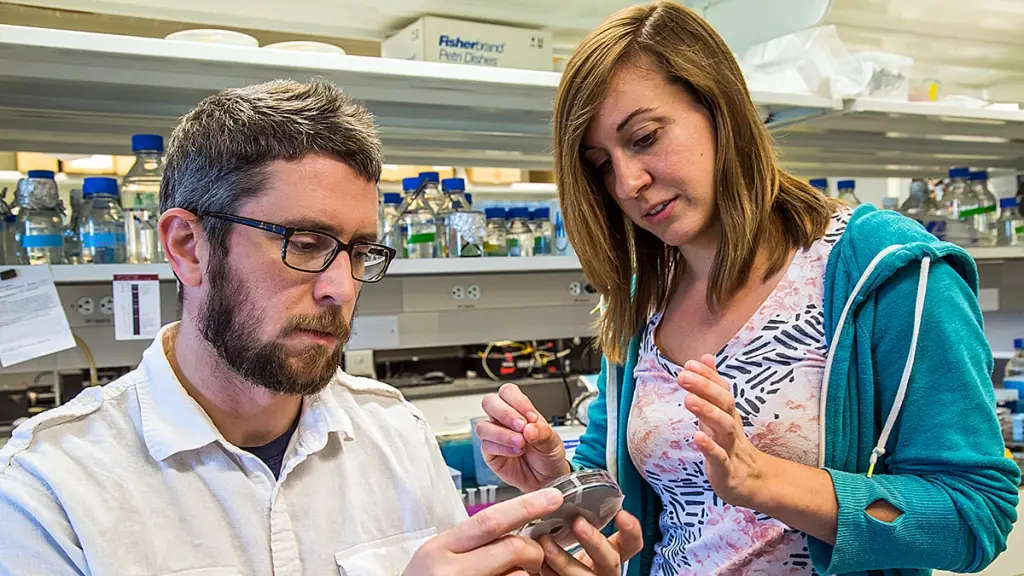
- Acceptance rate: 4.4%
- Average entry score: 1570 SAT or 35 ACT
- Student-to-faculty ratio: 5:1
- Estimated cost of attendance (tuition and fees): $78,490
- Average earning potential for graduates: $65,473 (College Factual)
Princeton’s Department of Chemical and Biological Engineering is home to some of the most renowned chemists and chemical engineers in the world. The department offers a wide array of undergraduate and graduate degree programs that prepare students for careers in academia, industry, or research.
Easily accessible faculty and staff are available to help students with their academic, research, and professional endeavors. The department also provides students with access to numerous resources such as laboratories, libraries, and computer facilities.
All these make Princeton University a top choice for students who want to pursue a career in the field of chemical and biological engineering.
#4. Columbia University


- Acceptance rate: 4.1%
- Average entry score: 1440-1570 SAT or 34-35 ACT
- Student-to-faculty ratio: 6:1
- Estimated cost of attendance (tuition and fees): $85,000
- Average earning potential for graduates: $67,852 (College Factual)
Columbia University has a well-deserved reputation for their interdisciplinary approach to education, with a focus on real-world problem-solving. Their faculty are some of the most accomplished in their fields. They have a long history of developing top-notch engineers.
With over 50 years of experience in the field, Columbia is one of the oldest chemical engineering schools in the country. They offer undergraduate and graduate programs for students interested in chemical engineering and many other STEM fields.
Chemical engineering graduates from Columbia go on to have successful careers in the chemical industry, pharmaceuticals, and many other fields. They are also highly sought after by employers in industries outside of science and technology.
#3. Massachusetts Institute of Technology


- Acceptance rate: 4%
- Average entry score: 1570 SAT or 36 ACT
- Student-to-faculty ratio: 3:1
- Estimated cost of attendance (tuition and fees): $77,570
- Average earning potential for graduates: $89,710 (Prodigy Finance)
MIT provides a unique environment that fosters intellectual, social and personal growth. The university offers a wide range of disciplines in the arts and sciences, as well as engineering, architecture, and management.
Chemical engineering students at MIT have access to state-of-the-art facilities and resources, including a wide range of laboratories and research centers. Students can also participate in undergraduate research programs that are unique only to MIT.
The chemical engineering faculty is known for its leadership in research and innovation. They are dedicated to producing the next generation of chemical engineers who will help shape our society through their work in industry, government, and academia.
What is it like to study chemical engineering at MIT?
#2. Stanford University


- Acceptance rate: 3.9%
- Average entry score: 1470-1570 SAT or 34-35 ACT
- Student-to-faculty ratio: 5:1
- Estimated cost of attendance (tuition and fees): $78,898
- Average earning potential for graduates: $84,200 (Engineering 360)
The mission of Stanford University is to discover, develop and disseminate knowledge and understanding in the service of humanity.
This school’s dedication to excellence extends to its chemical engineering program, which offers a world-class education in an environment that encourages students’ academic growth.
Students at Stanford enjoy access to some of the best resources in the country including libraries, laboratories, and research facilities. Coupled with a world-class faculty, Stanford’s chemical engineering program is one of the best in the nation.
The school’s proximity to Silicon Valley has helped it attract many top-tier researchers and companies. This provides students with an unparalleled opportunity to interact with professionals from a variety of fields.
What is it like to study chemical engineering at Stanford?
#1. California Institute of Technology


- Acceptance rate: 3.9%
- Average entry score: 1530-1560 SAT
- Student-to-faculty ratio: 3:1
- Estimated cost of attendance (tuition and fees): $83,598
- Average earning potential for graduates: $60,388 (Glassdoor)
Caltech’s Division of Chemistry and Chemical Engineering boasts a highly-rated program that provides students with an opportunity to study chemical engineering, as well as chemistry.
The school’s faculty is comprised of many notable chemists and chemical engineers who conduct cutting-edge research in the field of chemical engineering.
Therefore, students at Caltech are exposed to the latest advancements in their field and learn from experts in their respective disciplines. In addition to its excellent academic reputation, Caltech is also well-known for its beautiful campus and cutting-edge facilities.
What is it like to study at Caltech?
Conclusion
The field of chemical engineering offers a wide range of exciting and rewarding career opportunities, and choosing the right school is a critical step toward success.
These colleges are some of the most highly ranked in the country. They offer unique advantages and opportunities for students to develop their skills, engage in cutting-edge research—and prepare for a successful career.
Whether you’re looking for a large, research-focused university, a smaller learning environment, or something in between—there’s a chemical engineering program that’s just right for you.
Selection Criteria
Here are the selection criteria for our list of the 25 best schools for chemical engineering programs in the US:
- Reputation and ranking of the school: We looked for schools that have a strong reputation and high ranking in the chemical engineering field.
- Faculty expertise and specialization: We researched the faculty members and their areas of expertise to ensure that the school has professors with relevant expertise across the major areas of chemical engineering.
- Facilities, resources, and access to technology: Our team considered the quality of the school’s facilities and resources, such as labs, equipment, and libraries. We also considered the school’s access to the latest technology and equipment.
- Cost and financial aid: Our research team took into account the cost of attendance and the availability of financial aid options for students.
- Diversity and inclusivity: We considered the school’s diversity and inclusivity. A diverse and inclusive environment will enhance your educational experience.
- Graduation and placement rate: We looked at the school’s graduation and placement rate to see how well students fare after graduation.
- Extracurricular activities: Our team evaluated the availability of extracurricular activities and clubs that align with your interests.
- Alumni network and post-graduation support: We considered the school’s alumni network as this is important for mentorship, internships, and job opportunities after graduation. Our team also focused on the school’s post-graduation support services, such as career counseling and job placement.
Frequently Asked Questions
Q1. Are chemical engineers in high demand?
Yes, chemical engineers are in high demand. The Bureau of Labor Statistics predicts that the number of jobs for chemical engineers will grow by 14% from 2021 to 2031, which is much faster than the average growth rate for all occupations.
Chemical engineers are highly sought after for their ability to help solve some of the world’s most pressing problems. They design processes and systems that help us manufacture everything from pharmaceuticals and chemicals to food products.
Q2. Which industry hires the most chemical engineers?
The highest number of chemical engineers work in the manufacturing industry. This includes manufacturing companies that make consumer goods and industrial products.
Chemical engineers work for construction firms, scientific research, development services, and administrative support companies. They also find employment with utilities and oil extraction plants.
Q3. What is the highest-paid chemical engineer job?
The highest-paid chemical engineers work in the pharmaceutical and medical device industries. They design, develop and test drugs and medical devices to ensure they are safe for humans.
Some of the highest-paying chemical engineering jobs include pesticide chemists, pharmaceutical research and development scientists, and food scientists. The following article will help you learn about the top chemical engineering jobs and salaries.
Q4. Which Ivy League is best for chemical engineering?
Ivy League schools are well known for their strong academics and high standards. Although they may be difficult to get into, these schools are well worth it. While all Ivy League schools are known for their rigorous academics, some are better than others in chemical engineering.
Cornell and Princeton are the best Ivy League schools for chemical engineering. These two schools have the best chemical engineering programs in the country.
Q5. What are the admission requirements for chemical engineering programs at top universities?
While there are no set admission requirements for chemical engineering programs, most of the top schools in the country have similar requirements.
In general, you’ll need good high school grades and strong SAT or ACT scores. You should also submit a strong application essay and letters of recommendation.
References
[1] Official Websites
[2] Salary Data from Glass Door, College Factual, College Simply, Zippia, Gradreports
[3] Ranking references including news media such as Best Chemical Engineering Programs.


